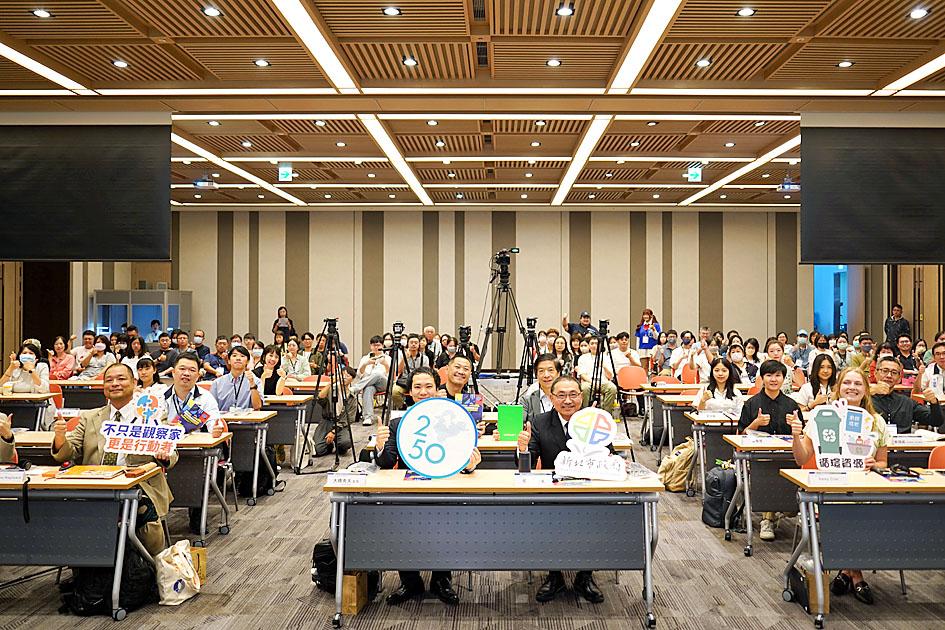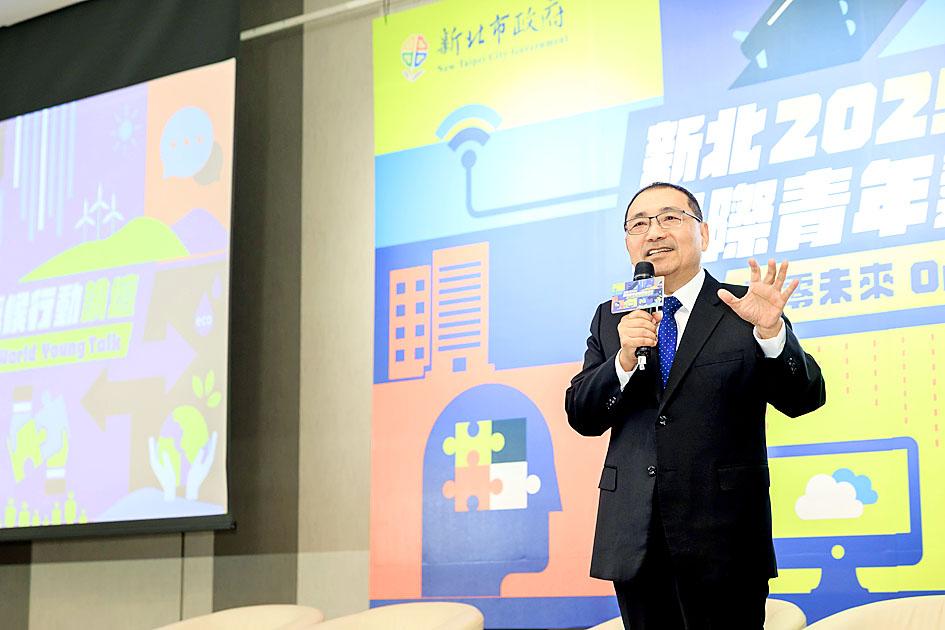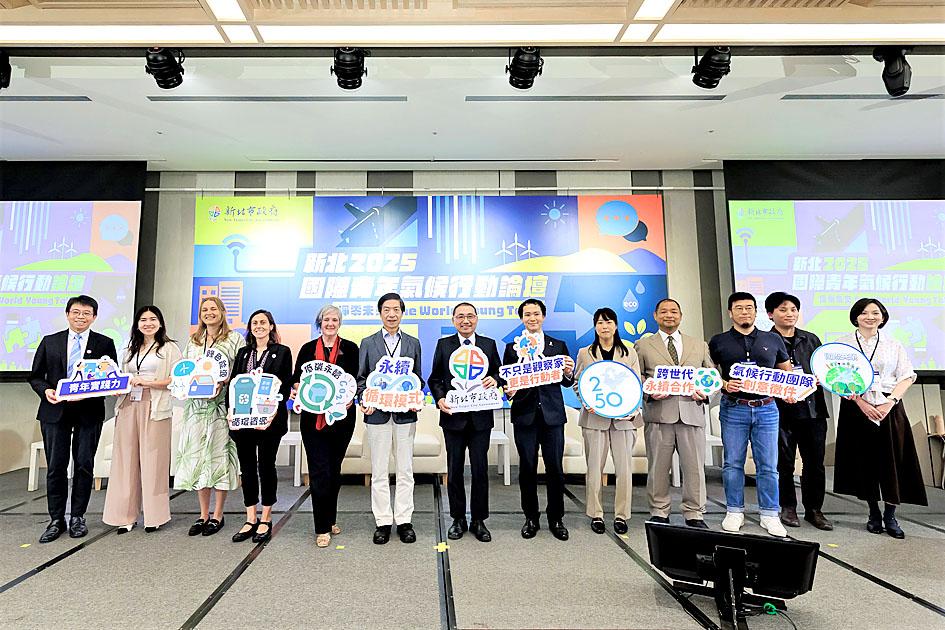New Taipei City hosted the 2025 New Taipei International Youth Climate Action Forum, bringing together young leaders and experts from South Korea, Japan, Canada, the US and Taiwanese youth. The forum focused on exchanging strategies for climate action amid growing environmental challenges and celebrated innovation by awarding the winners of the Second Youth Climate Action Proposal Contest, encouraging them to transform creative ideas into impactful practices.
“As Taiwan’s most populous city, New Taipei City is addressing the severe challenges posed by extreme climate change,” Mayor Hou Yu-ih said.
“The city has aligned its municipal strategies with global standards, setting a clear path toward our 2050 net zero goal,” he said. “This commitment is detailed in our Net Zero Action White Paper and Voluntary Local Review.”

Photo courtesy of the New Taipei City’s Environmental Protection Department
“I am proud to announce that we reached a key milestone in 2022, achieving our goal of becoming a coal-free industrial city ahead of schedule,” Hou said.
The innovation and energy of the youth are critical driving forces in this transition, he said.
“This International Youth Climate Forum provides a global stage for young leaders to share their achievements,” Hou said. “Our goal is to cultivate a deep-rooted awareness of sustainable development, empower young people with the courage to innovate and collectively shape a ‘Net Zero Future’ by turning sustainable ideals into concrete actions.”

Photo courtesy of the New Taipei City’s Environmental Protection Department
Hou took the stage to honor the four winning teams of the Second Youth Climate Action Proposal Contest.
The Gold Award was presented to Chuang You-hsi , Tsai Shin-en , Jao Zi-yi , Lin Yun-an and Lin Yu-an from Kang Chiao International School in New Taipei for their project “Recycled Oil Into Eco-Soap: A Greener World.”
The Silver Award went to Wang Jia-wei, Liao Yi-ting, Chen Li-feng and Hsieh Wei-chia from National Chung Cheng University for their project titled “Youth Leadership.”

Photo courtesy of the New Taipei City’s Environmental Protection Department
Two other projects received honorable mentions: “Renewable Solar Energy Battery Charging Station” by National Taiwan University’s Chen Yen-tseng and National Sun Yat-sen University’s Lin Tzu-Yu, as well “Empower Youth, Reviving the Coast” by Chien Chia-hsin (National Yang Ming Chiao Tung University), Huang Kai-chi and Lian Pin-ying (National Ilan University), and Chou Mei-Fan (Taipei Municipal Senior High School Experimental Education).
Hou praised the young leaders for stepping onto the global stage with innovative proposals covering circular economy, environmental education and ecological sustainability, while putting local climate actions into practice and amplifying their impact.
New Taipei City ‘s Environmental Protection Department said that the forum, the theme of which was “Net-Zero Future: One World Young Talk,” featured a keynote address by professor Yeh Shin-cheng, the deputy chairperson of the New Taipei City Climate Change Response Steering Groups and a distinguished professor at National Taiwan Normal University’s Graduate Institute of Sustainability Management and Environmental Education.
Yeh said that youth-led initiatives are far more impactful when integrated with education, community engagement and institutional design, creating replicable models that support government policies.
The forum showcased the practicality and perseverance of Taiwanese youth, which are essential foundations for advancing sustainable development, he said.
New Taipei City Youth Department Commissioner Marcia Qiu said that the youth are a crucial force in driving sustainable development. She encouraged young people to act locally while connecting globally, turning innovative ideas into practice. Environmental Protection Department Commissioner Cheng Da-wei concluded by saying that the department is committed to promoting environmental education across all ages, ensuring climate literacy is instilled from a young age, to become an invaluable asset for future generations.
The forum was structured around the “Four Phases of Youth Climate Action,” featuring insights from international experts on practical global strategies.
Moon Jae-hyoung from South Korea emphasized the critical role of everyday food choices in the climate crisis, saying that sustainable agriculture can foster a fairer and more resilient future. Go Wayne Hagiwara of Japan introduced the concept of “Regional Circular Symbiotic Hubs,” illustrating how local governance can foster self-sufficient, sustainable communities balancing ecology, economy and social well-being. Deb L. Morrison of Canada, in her keynote titled “Igniting Action,” called on the youth to move beyond advocacy into tangible action, and become active designers and drivers of climate solutions. Andra Yeghoian from the US explained how education and project-based learning can empower youth to “catalyze change,” fostering creativity and inspiring collective action toward a sustainable, net zero world.
The Environmental Protection Department reaffirmed New Taipei City’s commitment to advancing youth sustainability education and interdisciplinary collaboration, empowering young people to propose and implement creative solutions for shaping a net zero future. Through international dialogue and the exchange of local case studies, the forum not only enhanced youth’s knowledge and capabilities to tackle climate change, but also transformed “climate action” from a distant ideal into a powerful, tangible social force.
Taiwanese Youth Climate Action Practice Cases
Recycled Oil Into Eco-Soap: A Greener World
Recycled Oil Into Eco-Soap: A Greener World transforms discarded expired cooking oil into a force for environmental and social good. In the first phase, the Expired Oil Recovery Program engaged communities and schools to promote the idea of proper recycling, inviting residents to donate expired cooking oil, which the team turned into soap-making kits.
In the second phase, the Used Oil Regeneration Soap Workshop collaborated with NPOs, schools, businesses and Step30 to conduct engaging, safe workshops, guiding participants in crafting eco-friendly soaps while embedding knowledge of sustainability and cleaning science.
In the third phase, the Soap Sharing for Good Action donated thousands of soaps to local welfare organizations and rural schools, with some neem-infused soaps sent to Kenya via Step30 to help medical teams there to combat sand fleas.
This initiative extends the life of oil in a way that embodies the value of “waste to treasure,” and fulfills dual goals of environmental protection and social care.
Youth Leadership
The Integrated Frog Interactive Platform harnessed technology to empower eco tours. Using artificial intelligence and gamified design, the team developed a digital guide system for frogs to address challenges in wildlife observation, such as hard-to-spot species in eco tours, delivering vivid ecological knowledge through high-quality frog calls and interactive content. The system features modular frog information, Line-based smart question-and-answer, and interactive adventure stories designed for children. Set at New Taipei’s Alibang Ecological Farm, the project weaves ecological knowledge into environmental education, enabling participating families to “learn through play, understand through questions,” effortlessly overcoming learning barriers and fostering biodiversity awareness. This project enhances the educational depth and interactivity of tours, encouraging the youth and residents to cocreate and protect local ecosystems through technology.
Renewable Solar Energy Battery Charging Station
Renewable Solar Energy Battery Charging Station initiative utilized recycled batteries and solar technology to create portable renewable battery packs, fostering low-carbon lifestyles and community resilience. During regular times, it would offer residents free charging as a way to promote energy conservation and carbon reduction. In disasters, it would be deployed swiftly to affected areas to aid in providing lighting, communication and charging of small medical devices, which would enhance emergency responses. The project recycled batteries and cut about 100kg to 200kg of carbon emissions annually while reducing electronic waste. Partnering with universities, the pilot project hosted hands-on assembly workshops and sustainability lectures, cultivating operational and maintenance skills, encouraging citizens to participate in environmental, social and governance (ESG) activities, and providing a replicable solution for low-carbon transformation.
Empowering Youth, Reviving the Coast
Empowering Youth, Reviving the Coast addressed climate change and local decline crises on the northern coast of New Taipei City, aiming to break the cycle of economic stagnation, youth exodus, knowledge gaps and ecological degradation. The project transformed Alibang Ecological Farm into a “living climate change classroom,” offering courses such as “The Journey of Water” to help residents and the youth understand climate challenges and foster sustainable awareness and practices. The Youth Catalyst Program also built a professional development pathway from interns to researchers, empowering the youth to evolve from volunteers into ESG project planners, sparking local innovation. Additionally, the project designed ESG experience programs, integrating corporate and university social responsibility to generate stable income for youth engaged in training and community ecological work, forming a self-sustaining economic cycle. Ultimately, it established the North Coast Resilience Alliance, uniting businesses, universities and communities to empower the youth as the core force for local climate resilience and sustainable development, creating a replicable social enterprise model that ignites hope for the northern coast.

SHIPS, TRAINS AND AUTOMOBILES: The ministry has announced changes to varied transportation industries taking effect soon, with a number of effects for passengers Beginning next month, the post office is canceling signature upon delivery and written inquiry services for international registered small packets in accordance with the new policy of the Universal Postal Union, the Ministry of Transportation and Communications said yesterday. The new policy does not apply to packets that are to be delivered to China, the ministry said. Senders of international registered small packets would receive a NT$10 rebate on postage if the packets are sent from Jan. 1 to March 31, it added. The ministry said that three other policies are also scheduled to take effect next month. International cruise ship operators

NUMBERS IMBALANCE: More than 4 million Taiwanese have visited China this year, while only about half a million Chinese have visited here Beijing has yet to respond to Taiwan’s requests for negotiation over matters related to the recovery of cross-strait tourism, the Tourism Administration said yesterday. Taiwan’s tourism authority issued the statement after Chinese-language daily the China Times reported yesterday that the government’s policy of banning group tours to China does not stop Taiwanese from visiting the country. As of October, more than 4.2 million had traveled to China this year, exceeding last year. Beijing estimated the number of Taiwanese tourists in China could reach 4.5 million this year. By contrast, only 500,000 Chinese tourists are expected in Taiwan, the report said. The report

HORROR STORIES: One victim recounted not realizing they had been stabbed and seeing people bleeding, while another recalled breaking down in tears after fleeing A man on Friday died after he tried to fight the knife-wielding suspect who went on a stabbing spree near two of Taipei’s busiest metro stations, Taipei Mayor Chiang Wan-an (蔣萬安) said. The 57-year-old man, identified by his family name, Yu (余), encountered the suspect at Exit M7 of Taipei Main Station and immediately tried to stop him, but was fatally wounded and later died, Chiang said, calling the incident “heartbreaking.” Yu’s family would receive at least NT$5 million (US$158,584) in compensation through the Taipei Rapid Transit Corp’s (TRTC) insurance coverage, he said after convening an emergency security response meeting yesterday morning. National

The Forestry and Nature Conservation Agency yesterday launched a gift box to market honey “certified by a Formosan black bear” in appreciation of a beekeeper’s amicable interaction with a honey-thieving bear. Beekeeper Chih Ming-chen (池明鎮) in January inspected his bee farm in Hualien County’s Jhuosi Township (卓溪) and found that more than 20 beehives had been destroyed and many hives were eaten, with bear droppings and paw prints near the destroyed hives, the agency said. Chih returned to the farm to move the remaining beehives away that evening when he encountered a Formosan black bear only 20m away, the agency said. The bear